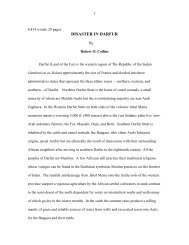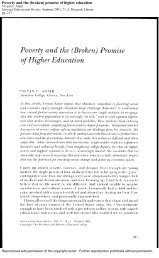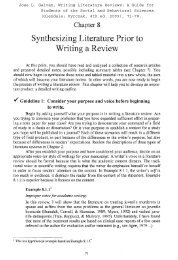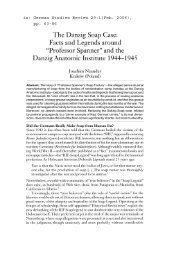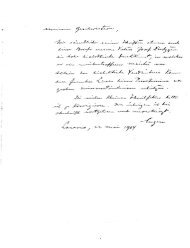Xenophon"s Anabasis and the Origin's of Military Autobiography
Xenophon"s Anabasis and the Origin's of Military Autobiography
Xenophon"s Anabasis and the Origin's of Military Autobiography
Create successful ePaper yourself
Turn your PDF publications into a flip-book with our unique Google optimized e-Paper software.
One<br />
Xenophon's <strong>Anabasis</strong> <strong>and</strong><br />
<strong>the</strong> Origins <strong>of</strong> <strong>Military</strong><br />
<strong>Autobiography</strong><br />
jOHN W. I. LEE<br />
'<br />
In <strong>the</strong> fourth century BC, Xenophon, a wealthy, aristocratic A<strong>the</strong>nian<br />
<strong>and</strong> sometime associate <strong>of</strong> <strong>the</strong> philosopher Socrates, wrote <strong>the</strong> first soldier's<br />
memoir in world literature: <strong>the</strong> <strong>Anabasis</strong>.'<br />
The <strong>Anabasis</strong> is a prose account, written in <strong>the</strong> third person, some<br />
ten thous<strong>and</strong> words long. In it Xenophon tells <strong>the</strong> story <strong>of</strong> <strong>the</strong> Cyreans,<br />
mercenaries recruited by <strong>the</strong> Achaemenid prince Cyrus for his abortive<br />
attempt to usurp <strong>the</strong> throne <strong>of</strong> <strong>the</strong> Persian empire. The text begins ra<strong>the</strong>r<br />
abruptly in 402 BC with <strong>the</strong> immediate background to Cyrus' expedition.<br />
From <strong>the</strong>re Xenophon traces <strong>the</strong> march <strong>of</strong> Cyrus <strong>and</strong> his troops toward<br />
<strong>the</strong> Persian capital <strong>of</strong> Babylon, recounts Cyrus's death at <strong>the</strong> battle <strong>of</strong><br />
Cunaxa in 401, <strong>and</strong> follows <strong>the</strong> Cyreans as <strong>the</strong>y make an arduous escape<br />
north from Mesopotamia to <strong>the</strong> Black Sea. The account ends, even more<br />
abruptly than it began, with <strong>the</strong> surviving mercenaries joining a Spartan<br />
army in March 399· Along with a detailed, day-by-day narrative <strong>of</strong> <strong>the</strong><br />
Cyrean march, Xenophon includes speeches in direct address, ethnographic<br />
<strong>and</strong> geographic observations, <strong>and</strong> tactical advice. Unique among<br />
ancient Greek authors, he records <strong>the</strong> experiences <strong>and</strong> reactions <strong>of</strong> common<br />
soldiers at war. Indeed, <strong>the</strong> <strong>Anabasis</strong> has been called "<strong>the</strong> only work<br />
that throws light upon <strong>the</strong> facts <strong>of</strong> military life" in classical Greece. 2 For<br />
<strong>the</strong>se reasons, <strong>the</strong> <strong>Anabasis</strong> is today read most <strong>of</strong>ten by scholars <strong>of</strong> ancient<br />
history, who find in it invaluable information on Greek warfare, politics,<br />
arid culture in <strong>the</strong> fifth <strong>and</strong> fourth centuries BC.<br />
This essay, however, is not written from a historical point <strong>of</strong> view but<br />
ra<strong>the</strong>r takes a different, more literary approach to <strong>the</strong> <strong>Anabasis</strong>. It begins by<br />
looking at when <strong>and</strong> why Xenophon composed <strong>the</strong> <strong>Anabasis</strong>. Then it employs<br />
perspectives from Samuel Hynes's work on personal narratives <strong>of</strong>
42 I Arms <strong>and</strong> <strong>the</strong> Self<br />
war to find what, if anything, Xenophon finds in common with modem<br />
writers <strong>of</strong> <strong>the</strong> soldiers' tale. Finally, Xenophon's influence on subsequent<br />
military life writing merits recognition as <strong>the</strong> progenitor <strong>of</strong> <strong>the</strong> military<br />
autobiographical tradition.<br />
Historical Background<br />
Greece at <strong>the</strong> end <strong>of</strong> <strong>the</strong> fifth century BC was an \illSettled, \illcertain place,<br />
its poleis (city-states) still sorting through <strong>the</strong> aftermath <strong>of</strong> <strong>the</strong> agonizing<br />
Peloponnesian War (431-404). The once-mighty A<strong>the</strong>nians, shorn <strong>of</strong> <strong>the</strong>ir<br />
maritime empire, had seen <strong>the</strong>ir city walls demolished to <strong>the</strong> music <strong>of</strong><br />
flute girls. For a time even A<strong>the</strong>ns's famed democracy had disappeared,<br />
replaced by a murderous aristocratic junta. The victorious Spartans faced<br />
challenges <strong>of</strong> <strong>the</strong>ir own. Wartime allies <strong>and</strong> former A<strong>the</strong>nian subjects<br />
chafed under Sparta's overbearing hegemony; while Sparta had gone to<br />
war under <strong>the</strong> banner <strong>of</strong> Greek freedom it now began to seem a tyrant.<br />
And across <strong>the</strong> Aegean Sea loomed <strong>the</strong> immensity <strong>of</strong> Achaemenid Persia,<br />
chastened by <strong>the</strong> Greeks at <strong>the</strong> battles <strong>of</strong> Marathon <strong>and</strong> Salamis nearly a<br />
century before but still <strong>the</strong> mightiest empire <strong>the</strong> world had yet known.<br />
In <strong>the</strong> years following <strong>the</strong> Peloponnesian War, thous<strong>and</strong>s <strong>of</strong> Greeks<br />
sought escape from <strong>the</strong> economic <strong>and</strong> political difficulties <strong>of</strong> <strong>the</strong>ir homel<strong>and</strong><br />
by taking up arms for perhaps <strong>the</strong> most unexpected <strong>of</strong> paymasters:<br />
<strong>the</strong> Persians. Mercenary service was nothing new to <strong>the</strong> Mediterraneanalready<br />
in <strong>the</strong> early seventh century BC Greek soldiers <strong>of</strong> fortune in Egypt<br />
were chopping graffiti into pharaohs' basalt statues-but by <strong>the</strong> end <strong>of</strong> <strong>the</strong><br />
fifth century unprecedented numbers <strong>of</strong> Greeks had entered Persian employment.'<br />
Many became garrison troops for <strong>the</strong> Persian-controlled Greek<br />
cities <strong>of</strong> Ionia, in western Asia Minor. It would have raised no eyebrows,<br />
<strong>the</strong>refore, when in late 402 BC a twenty-three-year-old Persian prince named<br />
Cyrus dispatched orders to his Ionian garrison comm<strong>and</strong>ers instructing<br />
<strong>the</strong>m to "enlist as many ... soldiers <strong>of</strong> <strong>the</strong> best sort as <strong>the</strong>y could" (Anab.<br />
1.1.6).4 Unbeknown to his comm<strong>and</strong>ers, however, <strong>the</strong> prince was plotting<br />
to usurp <strong>the</strong> throne <strong>of</strong> his older bro<strong>the</strong>r Artaxerxes II, great king <strong>of</strong><br />
Achaen\enid Persia.5 Having ga<strong>the</strong>red some twelve thous<strong>and</strong> mercenary<br />
foot soldiers along with an uncertain number <strong>of</strong> Persian levies, Cyrus set<br />
out in March 401 from his provincial capital <strong>of</strong> Sardis (modern Sart, in western<br />
Turkey). The young prince at first pr<strong>of</strong>fered a succession <strong>of</strong> flimsy pretexts<br />
for <strong>the</strong> expedition, but as his force marched across Anatolia <strong>and</strong> into<br />
<strong>the</strong> heart <strong>of</strong> Mesopotamia, <strong>the</strong> mercenaries finally discovered Cyrus's true<br />
purpose. A few deserted, but for <strong>the</strong> majority it was too late to back out.
Xenophon' s <strong>Anabasis</strong> I 43<br />
In September <strong>the</strong> armies <strong>of</strong> Cyrus <strong>and</strong> Artaxerxes met near Cunaxa~<br />
a hamlet just north <strong>of</strong> Babylon. Cyrus's heavily armed mercenaries won<br />
him <strong>the</strong> battle, but <strong>the</strong> prince himself was killed in <strong>the</strong> fighting. His native<br />
troops quickly fled or switched <strong>the</strong>ir loyalties to Artaxerxes, leaving<br />
<strong>the</strong> mercenaries str<strong>and</strong>ed in unfamiliar <strong>and</strong> hostile territory. Their comm<strong>and</strong>ers<br />
attempted to negotiate a way out <strong>of</strong> <strong>the</strong> predicament but were<br />
lured into Artaxerxes' camp tmder a deceptive truce <strong>and</strong> <strong>the</strong>n massacred.<br />
Ra<strong>the</strong>r than surrendering or dispersing after this calamity, however, <strong>the</strong><br />
former mercenaries chose new leaders from <strong>the</strong>ir ranks <strong>and</strong> embarked on<br />
an arduous trek out <strong>of</strong> Persian territory. Unable to return <strong>the</strong> way <strong>the</strong>y<br />
carne, <strong>the</strong> troops slogged north up <strong>the</strong> Tigris valley, ' <strong>the</strong>n across <strong>the</strong> rugged<br />
mountains <strong>of</strong> what is today eastern Turkey, finally reaching <strong>the</strong> Black<br />
Sea at Trapezus (Trabzon) in February 400. From <strong>the</strong>re <strong>the</strong>y marched west<br />
along <strong>the</strong> water, plundering coastal settlements as <strong>the</strong>y went. Arriving at<br />
Byzantium (Istanbul) that October, <strong>the</strong> soldiers <strong>the</strong>n spent <strong>the</strong> winter as<br />
employees <strong>of</strong> <strong>the</strong> dynast Seu<strong>the</strong>s in European Thrace .<br />
. Finally, in March 399 <strong>the</strong> survivors were incorporated into a Spartan<br />
army assembling in western Asia Minor under <strong>the</strong> general Thibron. In<br />
two years <strong>of</strong> marching <strong>and</strong> fighting, <strong>the</strong> Cyreans had covered some two<br />
thous<strong>and</strong> miles-a journey roughly equivalent to walking from Los Angeles,<br />
California, to Chicago, Illinois.6 Of <strong>the</strong> twelve thous<strong>and</strong> Cyreans who<br />
set out from Sardis in March 401, approximately six thous<strong>and</strong> remained<br />
under arms in March 399· At least a thous<strong>and</strong> had deserted along <strong>the</strong> way;<br />
<strong>the</strong> o<strong>the</strong>rs had succumbed to wounds, frostbite, hunger, or disease.<br />
Xenophon's Life <strong>and</strong> Works<br />
Xenophon <strong>the</strong> son <strong>of</strong> Gryllus was born about 427 sc into a wealthy, aristocratic<br />
family from <strong>the</strong> derne (district) <strong>of</strong> Erchia in rural Attica some ten<br />
miles east <strong>of</strong> A<strong>the</strong>ns proper.? "He was modest <strong>and</strong> superlatively h<strong>and</strong>some,"<br />
opines a much later biographer. 8 Xenophon spent his early years<br />
in a city at war. As a teenager, he probably rode with <strong>the</strong> A<strong>the</strong>nian cavalry<br />
helping defend Attic farml<strong>and</strong> against Spartan incursions. He also found<br />
time to join <strong>the</strong> circle <strong>of</strong> highborn young men who clustered admiringly<br />
ar?und Socrates. In 401/ at <strong>the</strong> invitation <strong>of</strong> his old friend Proxenus/ a<br />
twenty-something Xenophon joined <strong>the</strong> army <strong>of</strong> Cyrus. Proxenus, from<br />
Boeotia in central Greece, had recruited a mercenary contingent for Cyrus<br />
<strong>and</strong> held a general's rank in <strong>the</strong> army. For his part, Xenophon came along<br />
as a sort <strong>of</strong> observer, being "nei<strong>the</strong>r general nor captain nor common soldier"<br />
(A nab. 3.1.4). When <strong>the</strong> Cyrean comm<strong>and</strong>ers, Proxenus among <strong>the</strong>m,
44 I Arms <strong>and</strong> <strong>the</strong> Self<br />
were massacred after Cunaxa, Xenophon stepped forward in his friend's<br />
place. He became a general <strong>and</strong> helped lead <strong>the</strong> Cyreans on <strong>the</strong>ir retreat<br />
from Cunaxa to <strong>the</strong> sea <strong>and</strong> <strong>the</strong>nce to Byzantium.<br />
It would be decades, though, before Xenophon could set this story<br />
down on papyrus. He did not go home to A<strong>the</strong>ns in March 399 because<br />
<strong>the</strong> A<strong>the</strong>nians had sentenced him to exile during or shortly after <strong>the</strong> conclusion<br />
<strong>of</strong> <strong>the</strong> Cyrean march. 9 Instead, from 399 to 394 Xenophon remained<br />
in Asia Minor with <strong>the</strong> Cyreans. Although he clashed with Thibron, he<br />
got along famously with <strong>the</strong> Spartan king Agesilaus II (c. 445-359), who<br />
took over from Thibron in 396. w Agesilaus was supposed to be waging a<br />
panhellenic crusade against <strong>the</strong> "barbarian" Persians, but in 395 Sparta's<br />
erstwhile Greek allies rebelled, forcing Agesilaus's army back to mainl<strong>and</strong><br />
Hellas. Xenophon traveled with Agesilaus, allegedly even fighting<br />
on <strong>the</strong> Spartan side at <strong>the</strong> battle <strong>of</strong> Coronea in 394, against a Greek force<br />
that included A<strong>the</strong>nians. Unable to return to A<strong>the</strong>ns, Xenophon turned to<br />
Agesilaus <strong>and</strong> o<strong>the</strong>r Spartan friends, who in 387 granted him a country<br />
estate at Scillus, near Olympia, in <strong>the</strong> Peloponnesus. There Xenophon<br />
settled until at least 371. He married <strong>and</strong> had children, sending his two<br />
sons to be educated at Sparta. The collapse <strong>of</strong> Spartan hegemony in <strong>the</strong><br />
early 36os seems to have compelled Xenophon <strong>and</strong> his family to leave<br />
Scillus for Corinth, but a way home finally opened when, perhaps in 365,<br />
<strong>the</strong> A<strong>the</strong>nians rescinded <strong>the</strong>ir decree <strong>of</strong> exile. Xenophon divided <strong>the</strong> final<br />
years <strong>of</strong> his life between Corinth <strong>and</strong> A<strong>the</strong>ns. His sons served in <strong>the</strong> A<strong>the</strong>nian<br />
cavalry, helping to redeem <strong>the</strong>ir fa<strong>the</strong>r's reputation; one <strong>of</strong> <strong>the</strong>m,<br />
Gryllus, fell in battle for A<strong>the</strong>ns in 362. Exactly where Xenophon himself<br />
died, sometime around 355, remains uncertain; it may have been at<br />
Corinth, although five centuries later <strong>the</strong> locals at Scillus were fond <strong>of</strong><br />
showing Roman tourists "<strong>the</strong> tomb <strong>of</strong>.Xenophon. ""<br />
Wherever he died, it was at Scillus that Xenophon probably began<br />
writing in earnest. He wrote prodigiously, eventually producing some fourteen<br />
separate titles on a striking variety <strong>of</strong> subjects. His corpus includes<br />
philosophical dialogues; featuring Socrates; technical treatises on cavalry<br />
tactics, economics, horsemanship, hunting, <strong>and</strong> household management;<br />
a primer on Spartan government; a posthumous encomium <strong>of</strong> Agesilaus;<br />
a history <strong>of</strong> fourth-century Greece, a fictionalized biography <strong>of</strong> Cyrus <strong>the</strong><br />
Great (founder <strong>of</strong> <strong>the</strong> Persian Empire); <strong>and</strong> <strong>the</strong> <strong>Anabasis</strong>.<br />
Xenophon might have penned an early draft <strong>of</strong> <strong>the</strong> <strong>Anabasis</strong> while at<br />
Scillus, but <strong>the</strong> chronology <strong>of</strong> its composition remains a matter <strong>of</strong> contention.12<br />
Like several <strong>of</strong> his o<strong>the</strong>r works, it may have been set down in sec-
Xenophon's <strong>Anabasis</strong> I 45<br />
lions ra<strong>the</strong>r than as a unitary whole. There are some plausible grounds for<br />
a later date. For example, at one point in <strong>the</strong> text Xenophon seems to describe<br />
his Peloponnesian estate as a thing <strong>of</strong> <strong>the</strong> past. He reminds whoever<br />
holds <strong>and</strong> enjoys <strong>the</strong> place to <strong>of</strong>fer <strong>the</strong> proper sacrifices to Artemis, lest<br />
<strong>the</strong>y displease <strong>the</strong> goddess.'' The tone suggests that he was writing after<br />
his removal from Scillus, his second home. Given this, it is not unreasonable<br />
to suggest that <strong>the</strong> <strong>Anabasis</strong> in <strong>the</strong> form we possess today was published<br />
perhaps in <strong>the</strong> early 36os, after Xenophon left Scillus but before he<br />
was able to return to A<strong>the</strong>ns. Ultimately though, "all that can be said with<br />
confidence is that [it] was written late in Xenoph~m's life, not earlier." 1 4<br />
Consider, <strong>the</strong>n, <strong>the</strong> circumstances under which Xenophon came to<br />
write <strong>the</strong> <strong>Anabasis</strong>. Having spent a decade campaigning with <strong>the</strong> Cyreans<br />
<strong>and</strong> <strong>the</strong>n with <strong>the</strong> Spartans, he found himself an exile twice over, from A<strong>the</strong>ns<br />
<strong>and</strong> <strong>the</strong>n Scillus. He may have had some written records <strong>of</strong> <strong>the</strong> march~<br />
possibly lists <strong>of</strong> distances <strong>and</strong> routes traveled-but almost certainly no daily<br />
journal to spark his memory. '5 A full plate <strong>of</strong> o<strong>the</strong>r literary endeavors, from<br />
history to Socratic dialogues, dem<strong>and</strong>ed his attention. Moreover, Greece<br />
itself was in turmoil, because by <strong>the</strong> 36os <strong>the</strong> Thebans had defeated <strong>the</strong><br />
heret<strong>of</strong>ore invincible Spartans in battle <strong>and</strong> embarked on a short-lived hegemonic<br />
venture <strong>of</strong> <strong>the</strong>ir own. Why bo<strong>the</strong>r with <strong>the</strong> <strong>Anabasis</strong>?<br />
The <strong>Anabasis</strong> as Apologia<br />
There are certainly elements <strong>of</strong> <strong>the</strong> <strong>Anabasis</strong> that address <strong>the</strong> troubled times<br />
<strong>of</strong> its composition. For instance, Xenophon includes numerous passages<br />
<strong>of</strong> practical military advice, not just for battle in open country but also for<br />
maneuvering in rugged terrain against irregular foes. Such tactical lessons<br />
would have found a ready audience in war-wracked fourth century<br />
Greece. Moreover, <strong>the</strong> <strong>Anabasis</strong> bears a subtle but clear panhellenist message:<br />
if only <strong>the</strong> Greeks would stop wrangling amongst <strong>the</strong>mselves for<br />
hegemony at home <strong>and</strong> unite against Persia, <strong>the</strong>y could easily destroy<br />
<strong>the</strong> Achaemenid empire. 1 6 Xenophon emphasizes <strong>the</strong> weakness <strong>and</strong> cowardice<br />
<strong>of</strong> Persian troops in contrast to <strong>the</strong> manly, courageous Cyreans.<br />
Persian power, he implicitly asserts, is a Potemkin village; if <strong>the</strong> Cyreans<br />
marched <strong>the</strong>ir way in <strong>and</strong> out <strong>of</strong> Persian territory, surely ano<strong>the</strong>r Greek<br />
force could do <strong>the</strong> same. Indeed, <strong>the</strong> account <strong>of</strong> Cyrus's advance to Cunaxa<br />
essentially furnishes a road map-complete with descriptions <strong>of</strong> provisioning<br />
places, river crossings, <strong>and</strong> waterless stretches-for anyone planning<br />
to invade Mesopotamia. 1 7
46 I Arms <strong>and</strong> <strong>the</strong> Self<br />
The predominant answer to <strong>the</strong> question <strong>of</strong> why Xenophon wrote,<br />
however, remains <strong>the</strong> one by Felix Diirrbach more than a century ago: <strong>the</strong><br />
<strong>Anabasis</strong> is an apologia, a self-defense intended to justify or even exaggerate<br />
its author's actions during <strong>the</strong> march. ' 8 Those who accept this explanation<br />
note that Xenophon was nei<strong>the</strong>r <strong>the</strong> first nor <strong>the</strong> only writer to narrate<br />
<strong>the</strong> story <strong>of</strong> <strong>the</strong> Cyreans. In particular, at least one o<strong>the</strong>r general, Sophaenetus<br />
<strong>of</strong> Stymphalus, apparently produced his own <strong>Anabasis</strong>, <strong>of</strong> which only <strong>the</strong><br />
barest scraps survive. 1 9 It is impossible to reconstruct how Sophaenetus<br />
portrayed Xenophon, but some speculate that Xenophon wrote at least in<br />
part to publicize his own achievements, which he felt Sophaenetus had<br />
slighted. On this view, Xenophon adopted a third-person perspective to<br />
create an impression <strong>of</strong> greater objectivity, in essence to seduce <strong>the</strong> reader<br />
into believing Xenophon's version <strong>of</strong> events.<br />
Reading <strong>the</strong> <strong>Anabasis</strong> as apologia has its attractions because Xenophon<br />
sometimes comes <strong>of</strong>f as implausibly competent for a relatively inexperienced<br />
young man surrounded by seasoned, mostly older mercenaries.<br />
After <strong>the</strong> massacre <strong>of</strong> <strong>the</strong> generals, for instance, <strong>the</strong> Cyreans lie<br />
about in despair until Xenophon, prompted by a vision from Zeus, induces<br />
<strong>the</strong>m to take heart <strong>and</strong> appoint new <strong>of</strong>ficers. His military recommendations,<br />
whe<strong>the</strong>r <strong>the</strong>y involve preparing <strong>the</strong> army for <strong>the</strong> retreat, assaulting<br />
fortified enemy positions, or obtaining provisions, are ahnost<br />
invariably accepted, <strong>and</strong> <strong>the</strong>y always turn out to be <strong>the</strong> right ones. He is<br />
strong <strong>and</strong> brave when o<strong>the</strong>rs falter. In <strong>the</strong> mountains <strong>of</strong> Armenia, for<br />
example, with o<strong>the</strong>r men going snow-blind or freezing to death, Xenophon<br />
runs tirelessly back <strong>and</strong> forth along <strong>the</strong> army's marching column, distributing<br />
food <strong>and</strong> motivating stragglers. 20 Not even in wars <strong>of</strong> words does<br />
Xenophon come <strong>of</strong>f poorly. Those who st<strong>and</strong> up against him in <strong>of</strong>ficers'<br />
councils or <strong>the</strong> army assembly <strong>of</strong>ten end up humiliated or tongue-tied;<br />
Xenophon usually remains eloquent <strong>and</strong> persuasive. 21<br />
Yet even <strong>the</strong> most cynical reader cannot find Xenophon an insufferable<br />
apologist because he recounts his follies along with his successes. Like<br />
o<strong>the</strong>r Cyreans, Xenophon, when he realizes <strong>the</strong> true goal <strong>of</strong> <strong>the</strong> expedition,<br />
follows Cyrus more from fear <strong>of</strong> seeming cowardly than from anything<br />
else. He repeatedly stresses his youth, admittedly sometimes to underline<br />
his precocious ability, but at o<strong>the</strong>r times to highlight his shortcomings.'"'<br />
In Thrace with Seu<strong>the</strong>s he drinks too much <strong>and</strong> delivers an impromptu,<br />
too-flowery speech. Nor does he omit his ill-advised <strong>and</strong> unsuccessful attempt<br />
to found a colony on <strong>the</strong> Black Sea coast, an incident that fueled<br />
much dissension amongst <strong>the</strong> Cyreans. 2 3 Xenophon may dwell on his<br />
achievements, but he tempers <strong>the</strong>se with humor. At Cerasus on <strong>the</strong> Black
Xenophon's <strong>Anabasis</strong> I 47<br />
Sea, for example, he tells his troops to "take note that now, by <strong>the</strong> blessing<br />
<strong>of</strong> <strong>the</strong> gods, I am more confident than I was [before] <strong>and</strong> that I am bolder<br />
now than <strong>the</strong>n <strong>and</strong> drink more wine" (A nab. 5.8.1g). It is an appealing mix<br />
<strong>of</strong> boast <strong>and</strong> self-deprecation.<br />
So <strong>the</strong> <strong>Anabasis</strong> reveals a Xenophon who is not omnicompetent but<br />
sometimes callow, drunk, <strong>and</strong> foolish. Moreover, <strong>the</strong> narrative incorporates<br />
much that seems to have no place in an organized, intentional apologia.<br />
William Higgins makes <strong>the</strong> point forcefully:<br />
Why must Xenophonhave necessarily have J;.lad an immediately practical<br />
purpose in mind when writing <strong>the</strong> <strong>Anabasis</strong> ... ? Even if ... he<br />
could have blown <strong>the</strong> dust <strong>of</strong>f issues <strong>and</strong> events long past, why ...<br />
spend so much time [on] so many things unrelated to apologia, like<br />
... <strong>the</strong> different kinds <strong>of</strong> native dances, descriptions <strong>of</strong> foreign food<br />
<strong>and</strong> foreign customs, strategic devices like winter leggings, various<br />
kinds <strong>of</strong> bows, <strong>and</strong> ways to cut glare from <strong>the</strong> sunlit snow? What<br />
has apologia got to do with men chasing ostriches <strong>and</strong> wild donkeys<br />
or getting sick on honey?<br />
The <strong>Anabasis</strong>, Higgins continues, features Xenophon so prominently because<br />
it was intended as his idiosyncratic vision <strong>of</strong> <strong>the</strong> Cyrean march, not<br />
as a response to attacks by o<strong>the</strong>rs; <strong>the</strong> work is "avowedly, not deceitfully<br />
or apologetically, one-sided." 2 4 Those who would censure Xenophon for<br />
his inaccuracies would,in any case, do well to remember Trm O'Brien's<br />
comment, uln war you lose your sense <strong>of</strong> <strong>the</strong> definite, hence your sense <strong>of</strong><br />
truth itself, <strong>and</strong> <strong>the</strong>refore it's safe to say that in a true war story nothing is<br />
ever absolutely true." 2 5 Certainly <strong>the</strong> <strong>Anabasis</strong> constitutes to some degree<br />
tactical manual, panhellenist tract, even retrospective self-defense, but to<br />
focus on <strong>the</strong>se aspects exclusively is unsatisfying because it obscures <strong>the</strong><br />
defining character <strong>of</strong> <strong>the</strong> text: Xenophon himself.<br />
A Personal Journey<br />
The title <strong>Anabasis</strong> derives from <strong>the</strong> Greek verb anabaino, "go up" or "go<br />
inl<strong>and</strong>," hence its usual translation as The March Upcountry. In strictly geographical<br />
terms, as Leo Strauss noted, this describes only <strong>the</strong> first part <strong>of</strong><br />
Xenophon's story, <strong>the</strong> advance from Sardis to Cunaxa; o<strong>the</strong>rs divide <strong>the</strong><br />
remainder <strong>of</strong> <strong>the</strong> narrative into katabasis ("march downcountry;' from<br />
Cunaxa to <strong>the</strong> sea) <strong>and</strong> parabasis ("march alongside," on <strong>the</strong> Black Seacoast<br />
to Byzantium). 26 Yet such a literal interpretation seems misleading, as
48 I Acms ond <strong>the</strong> Self<br />
Diogenes Laertius intimated centuries ago. Xenophon, asserts Diogenes,<br />
"did not march into Persia just for Cyrus; he was seeking a way up to<br />
Zeus, whatever it might be. " 2 7 The title <strong>Anabasis</strong>, <strong>the</strong>n, need not refer so<br />
much to <strong>the</strong> physical path <strong>of</strong> Cyrus's army as to Xenophon's own metaphorical<br />
ascent, his journey from being "nei<strong>the</strong>r general nor captain nor<br />
private soldier" to being leader <strong>of</strong> <strong>the</strong> Cyreans.<br />
Xenophon's ascent begins in innocence. Nei<strong>the</strong>r he nor Proxenusnor<br />
any <strong>of</strong> <strong>the</strong> mercenaries for that matter-realize what lies ahead. 28<br />
Indeed, his preparations for <strong>the</strong> journey reveal a youthful impetuosity.<br />
Receiving <strong>the</strong> invitation from Proxenus, Xenophon asks <strong>the</strong> advice <strong>of</strong><br />
Socrates, who tells him to consult <strong>the</strong> oracle <strong>of</strong> Apollo at Delphi. This<br />
Xenophon does, although Socrates afterwards chides him "because he<br />
did not first put <strong>the</strong> question whe<strong>the</strong>r it were better for him to go or stay,<br />
but decided for himself that he was to go <strong>and</strong> <strong>the</strong>n asked <strong>the</strong> god as to<br />
<strong>the</strong> best way <strong>of</strong> going" (A nab. 3.1.7). Socrates had reason to be cautious<br />
because associating with a Persian prince was a good way for an aristocratic<br />
young man to get bad marks from <strong>the</strong> democratic A<strong>the</strong>nian government.<br />
Yet Xenophon, unaware that he will never see Socrates again,<br />
happily sets <strong>of</strong>f for Sardis <strong>and</strong> Cyrus. Before Cunaxa, Xenophon presents<br />
himself as awake but unaware, knowing where <strong>the</strong> expedition is<br />
headed but too ashamed to drop out. After Cunaxa <strong>and</strong> <strong>the</strong> massacre <strong>of</strong><br />
<strong>the</strong> generals, though, Xenophon's ascent, his spiritual njoumey up," accelerates<br />
abruptly. Inspired by Zeus, he awakens from despondency, rallies<br />
<strong>the</strong> dispirited Cyreans, becomes a general, <strong>and</strong> reorganizes <strong>the</strong> army<br />
for retreat. The remainder <strong>of</strong> <strong>the</strong> <strong>Anabasis</strong> demonstrates <strong>the</strong> possibilities<br />
<strong>and</strong> limitations for Xenophon <strong>of</strong> his new self-awareness. The march to<br />
<strong>the</strong> sea, for instance, is all about possibilities. There are hostile tribesmen<br />
to be overcome, mountain passes <strong>and</strong> rivers to be crossed, soldiers<br />
to be inspired <strong>and</strong> comm<strong>and</strong>ed. The Cyreans surpass one obstacle after<br />
ano<strong>the</strong>r, <strong>and</strong> with each step Xenophon accomplishes more, sees more,<br />
learns more.<br />
Along <strong>the</strong> Black Sea shore, however, <strong>the</strong> lessons are different. Despite<br />
all that Xenophon now knows, he fails in his colonizing venture,<br />
provokes division amongst <strong>the</strong> Cyreans, <strong>and</strong> finds his authority challenged<br />
by rival <strong>of</strong>ficers. Coastal settlements refuse to provide provisions, soldiers<br />
desert or mutiny, <strong>and</strong> <strong>the</strong> army splits temporarily into three factions.<br />
By its final chapters, Xenophon's narrative betrays a certain weariness<br />
as one battle blurs into <strong>the</strong> next. Xenophon would like to go home,<br />
but he is repeatedly prevented from relinquishing comm<strong>and</strong> <strong>of</strong> <strong>the</strong><br />
Cyreans. At last, he writes, "Thibron arrived <strong>and</strong> took over <strong>the</strong> army, <strong>and</strong>
Xenophon's <strong>Anabasis</strong> I 49<br />
uniting it with <strong>the</strong> rest <strong>of</strong> his Greek forces, proceeded to wage war" on <strong>the</strong><br />
Persians (Anab. 7.8.24). Yet even this final sentence carries no promise <strong>of</strong><br />
closure. Xenophon has made <strong>the</strong> journey from innocence to experience;<br />
his <strong>Anabasis</strong> is over, but his w<strong>and</strong>ering life has only just begun.<br />
Questions <strong>of</strong> Genre: Ancient <strong>and</strong> Modern<br />
If <strong>the</strong> <strong>Anabasis</strong> represents a personal vision <strong>of</strong> Xenophon's ascent to experience,<br />
where does it fit into <strong>the</strong> currents <strong>of</strong> ancient Greek literature? Paul<br />
Cartledge names <strong>the</strong> <strong>Anabasis</strong> "<strong>the</strong> earliest example <strong>of</strong> <strong>the</strong> genre <strong>of</strong> reflective<br />
autobiographical travelogue." '<br />
2 9 This is quite a mouthful <strong>and</strong> only<br />
reflects <strong>the</strong> difficulty <strong>of</strong> neatly categorizing such an innovative work.<br />
Xenophon clearly borrowed from a range <strong>of</strong> established classical genres,<br />
including travel writing, history, <strong>and</strong> rhetoric.3° For instance, <strong>the</strong> <strong>Anabasis</strong><br />
constitutes in some sense a historical account <strong>of</strong> Cyrus's expedition <strong>and</strong><br />
its aftermath, one in which "possibly for <strong>the</strong> first time in Greek historiography,<br />
<strong>the</strong> presentation <strong>of</strong> <strong>the</strong> individual <strong>and</strong> his activities are <strong>the</strong> primary<br />
means by which <strong>the</strong> historian communicates information about <strong>the</strong><br />
past. HJl At ano<strong>the</strong>r level, it represents a pioneer experiment in autobiography,<br />
a term for which fourth-century Greeks possessed no real equivalentY<br />
Or it can be seen as a prototype <strong>of</strong> <strong>the</strong> technical military-campaign<br />
commentary, <strong>of</strong> which Caesar's writings are probably <strong>the</strong> best-known<br />
examples. Yet pigeonholing <strong>the</strong> <strong>Anabasis</strong> into any single genre is as unsatisfying<br />
as reading its title literally. Much ancient literature did not hew to<br />
rigid boundaries; autobiographical writing in particular comprehended<br />
a range <strong>of</strong> overlapping traditions, lengths, forms, <strong>and</strong> styles. Xenophon<br />
likewise mixes history, autobiography, <strong>and</strong> didactic commentary, but his<br />
personal vision shapes <strong>the</strong> <strong>Anabasis</strong> into something altoge<strong>the</strong>r new.<br />
Although its form was unprecedented in antiquity, <strong>the</strong> <strong>Anabasis</strong> shares<br />
much in common with what Samuel Hynes calls <strong>the</strong> "personal narrative"<br />
genre <strong>of</strong> modern military writing, "first-person writings in prose by participants<br />
in <strong>the</strong> events recorded." For Hynes, post-facto memoirs are <strong>the</strong><br />
11<br />
ffiore complex kind <strong>of</strong> personal narrative: reflective, selective, more selfconsciously<br />
constructed than <strong>the</strong> immediate reports, an old self looking<br />
back-sometimes across half a century-at what <strong>the</strong> young self did, what<br />
happened to him, what changed him." Such memoirs are nei<strong>the</strong>r history,<br />
nor travel writing, nor autobiography, but stories, attempts to explain <strong>the</strong><br />
unexplainable sensations <strong>of</strong> war. And, Hynes asserts, <strong>the</strong>re is ualways one<br />
story-<strong>the</strong> individual's journey from innocence into experience, <strong>the</strong> serial<br />
discovery <strong>of</strong> what had before been unimaginable, <strong>the</strong> reality <strong>of</strong> war."3J
50 I Arms <strong>and</strong> <strong>the</strong> Self<br />
The congruence between <strong>the</strong> <strong>Anabasis</strong> <strong>and</strong> Hynes's conception <strong>of</strong> <strong>the</strong><br />
memoir as a journey into experience is evident. There are o<strong>the</strong>r congruencies.<br />
Modern memoirists, for instance, tend to report <strong>the</strong>ir wars plainly<br />
<strong>and</strong> without metaphor, adopting a style that comes "as close as language<br />
can to rendering <strong>the</strong> things <strong>of</strong> <strong>the</strong> material world as <strong>the</strong>y are."34 Some <strong>of</strong><br />
<strong>the</strong>m unconsciously, o<strong>the</strong>rs deliberately, <strong>the</strong>se memoirists focus on seeing,<br />
smelling, feeling <strong>the</strong> realities <strong>of</strong> war. Xenophon likewise appeals to physicality,<br />
to <strong>the</strong> language <strong>of</strong> <strong>the</strong> senses. Here is how he recounts part <strong>of</strong> <strong>the</strong><br />
Cyrean ordeal in <strong>the</strong> mountains <strong>of</strong> Armenia (A nab. 4-4-11-13):<br />
There came such a terrible snowfall ... that it completely covered<br />
both arms <strong>and</strong> men as <strong>the</strong>y slept ... <strong>and</strong> everybody was very reluctant<br />
to get up, for as <strong>the</strong> men lay <strong>the</strong>re <strong>the</strong> snow that had fallen upon<br />
<strong>the</strong>m ... was a source <strong>of</strong> warmth. But once Xenophon had mustered<br />
<strong>the</strong> courage to get up without his cloak <strong>and</strong> set about splitting wood,<br />
ano<strong>the</strong>r man also speedily got up, took <strong>the</strong> axe away from him, <strong>and</strong><br />
went on with <strong>the</strong> splitting. Thereupon <strong>the</strong> rest got up <strong>and</strong> proceeded<br />
to build fires <strong>and</strong> anoint <strong>the</strong>mselves; for <strong>the</strong>y found ointment <strong>the</strong>re<br />
in abundance whkh <strong>the</strong>y used in place <strong>of</strong> olive oil-made <strong>of</strong> pork<br />
fat, sesame, bitter almonds, or turpentine. They also found a fragrant<br />
oil made out <strong>of</strong> <strong>the</strong>se same ingredients.<br />
Even in its original Greek, this passage is straightforward <strong>and</strong> unadorned,<br />
no complex verb constructions or fancy word order. Notice in particular<br />
<strong>the</strong> specificity with which Xenophon names <strong>the</strong> ointment <strong>and</strong> oil his men<br />
find, how his description highlights <strong>the</strong> smell <strong>and</strong> feel <strong>of</strong> <strong>the</strong> moment.<br />
Indeed, he is always exacting in his choice <strong>of</strong> vocabulary. Like World War I<br />
soldiers who write "five-nines"-German 5·9 centimeter guns-ra<strong>the</strong>r<br />
than generic "artillery," Xenophon pays special attention to <strong>the</strong> vocabulary<br />
<strong>of</strong> destruction. When a weapon appears in <strong>the</strong> <strong>Anabasis</strong>, it is not just<br />
a "sword," but a machilira, a particular type <strong>of</strong> machete-like slashing blade,<br />
or an encheiridion, a knife small enough to be concealed in <strong>the</strong> h<strong>and</strong>.35<br />
In fact, Xenophon goes a step beyond <strong>the</strong> bounds Hynes sets. By<br />
using a third-person perspective, he essentially creates ano<strong>the</strong>r Xenophon,<br />
a younger self. The reader becomes Xenophon's older self, looking back<br />
across three decades at <strong>the</strong> brash youth who asked Apollo not whe<strong>the</strong>r he<br />
ought to join Cyrus but to which gods he should sacrifice before going.<br />
Like modem soldiers looking back at <strong>the</strong>ir wartime experiences, Xenophon<br />
confronts <strong>the</strong> challenges <strong>of</strong> fading memory <strong>and</strong> confined vision. He sue-
Xenophon's <strong>Anabasis</strong> I 51<br />
ceeds in bearing witness to how things felt, to what it was like to be <strong>the</strong>re,<br />
not because he sought to deceive but because he wanted to remember.<br />
Soldier Narrative <strong>and</strong> Comm<strong>and</strong>er Narrative<br />
Italo Calvina once compared reading <strong>the</strong> <strong>Anabasis</strong>, with its flickering images<br />
<strong>of</strong> men struggling against enemies <strong>and</strong> wea<strong>the</strong>r, to watching an old<br />
war documentary on late-night television.3 6 Yet <strong>the</strong> <strong>Anabasis</strong> is not just a<br />
modern soldiers' tale dressed up with spears <strong>and</strong> bronze helmets. For one<br />
thing, Xenophon is no common soldier but a gel(leral. Hynes excludes <strong>the</strong><br />
lives <strong>of</strong> generals, noting that "in modern wars, comm<strong>and</strong>ers don't usually<br />
do <strong>the</strong> fighting, or live with <strong>the</strong>ir troops, or get <strong>the</strong>mselves shot at."37<br />
Xenophon does all three, simply because his army travels in a different<br />
technological world. In <strong>the</strong> twentieth <strong>and</strong> twenty-first centuries, comm<strong>and</strong>er<br />
narratives <strong>and</strong> personal soldier narratives are inevitably separate<br />
affairs. Generals use radio or telephone to direct <strong>the</strong>ir troops, who <strong>of</strong> necessity<br />
spread out across <strong>the</strong> l<strong>and</strong>scape seeking cover <strong>and</strong> concealment.<br />
Artillery or air strikes can be summoned from miles away. The modern<br />
general is a battle manager, not a frontline fighter.<br />
This separation was impossible in antiquity, where long range on<br />
<strong>the</strong> battlefield meant no more than <strong>the</strong> two hundred yards or so that a<br />
skilled slinger could cast his lead bullet.3 8 Battles in <strong>the</strong> ancient Greek<br />
world were decided by men wielding shield <strong>and</strong> spear in close-order<br />
formation, <strong>the</strong>ir leaders fighting alongside <strong>the</strong>m ra<strong>the</strong>r than directing from<br />
<strong>the</strong> rear. The conditions <strong>of</strong> <strong>the</strong> Cyrean march, in addition, meant that Xenophon<br />
could never withdraw to a comfortable headquarters behind <strong>the</strong><br />
lines. The entire army was a front line, <strong>and</strong> so Xenophon marched, cooked,<br />
ate, <strong>and</strong> slept alongside his men, night <strong>and</strong> day, for two years. For him<br />
<strong>the</strong>re was no dividing line between comm<strong>and</strong>er narrative <strong>and</strong> soldier<br />
narrative.<br />
Of course, in modern warfare before <strong>the</strong> twentieth century, comm<strong>and</strong>ers<br />
<strong>of</strong>ten shared <strong>the</strong> dangers <strong>of</strong> battle <strong>and</strong> <strong>the</strong> hardships <strong>of</strong> campaign<br />
life with <strong>the</strong>ir troops. Even in nonmechanized armies, however, <strong>the</strong><br />
distance between comm<strong>and</strong>er <strong>and</strong> fighter persists, psychologically if not<br />
physically. Officers in eighteenth- <strong>and</strong> nineteenth-century European armies,<br />
for instance, for <strong>the</strong> most part were <strong>of</strong> a socioeconomic class distinctly<br />
different from that <strong>of</strong> <strong>the</strong> men <strong>the</strong>y comm<strong>and</strong>ed. Moreover, <strong>of</strong>ficer status<br />
tended to carry with it powerful social <strong>and</strong> legal privilege. The situation<br />
was entirely different for Xenophon. Among <strong>the</strong> Cyreans, <strong>of</strong>ficers could
52 I Arms <strong>and</strong> <strong>the</strong> Self<br />
be elected, <strong>and</strong> soldiers could voice <strong>the</strong>ir opinions in an army assembly.<br />
Corporal punishment, a disciplinary st<strong>and</strong>ard in European armies, was<br />
generally unacceptable to <strong>the</strong> Cyreans; Xenophon in fact found himself at<br />
one point accused in <strong>the</strong> assembly for having unjustly struck a soldier.39<br />
In <strong>the</strong> <strong>Anabasis</strong>, in o<strong>the</strong>r words, not just <strong>the</strong> physical but also <strong>the</strong> psychological<br />
distance between <strong>of</strong>ficers <strong>and</strong> men was minimal.<br />
Representations <strong>of</strong> Injury <strong>and</strong> Death<br />
The <strong>Anabasis</strong> also diverges from modern war memoirs in its representation<br />
<strong>of</strong> injury <strong>and</strong> death. Here again technological mediation has a decisive<br />
effect. Explosives, napalm, <strong>and</strong> high-velocity bullets, <strong>the</strong> staples <strong>of</strong><br />
twentieth- <strong>and</strong> twenty-first-century war, disfigure <strong>and</strong> destroy as <strong>the</strong>y kill.<br />
As Hynes notes, modem warfare turns even human bodies into grotesque,<br />
broken rubbish, hence <strong>the</strong> nauseating depictions <strong>of</strong> battlefield death that<br />
form a cornerstone <strong>of</strong> modem war memoirs.4° Things were different in<br />
antiquity. True, spears <strong>and</strong> swords could inflict horrible injuries-after<br />
<strong>the</strong> massacre <strong>of</strong> <strong>the</strong> generals, Xenophon records, "Nikarchos <strong>the</strong> Arkadian<br />
reached <strong>the</strong> camp in flight, wounded in his belly <strong>and</strong> holding his intestines<br />
in his h<strong>and</strong>s" (Anab. 2.5.33). Still, no ancient technology could wholly<br />
obliterate human bodies as a Japanese eight-inch shell did William<br />
Manchester's buddies one morning on Okinawa.4' The dead <strong>of</strong> <strong>the</strong> <strong>Anabasis</strong>,<br />
even horribly mutilated, remain recognizable as human forms. Nor<br />
did Xenophon regularly face death in <strong>the</strong> industrial quantities produced<br />
by machine guns, artillery, <strong>and</strong> poison gas. True, <strong>the</strong>re appear on occasion<br />
heaps <strong>of</strong> corpses for <strong>the</strong> Cyreans to deal with but never so many <strong>and</strong> not<br />
so <strong>of</strong>ten as in modem war. Death in <strong>the</strong> <strong>Anabasis</strong> appears fleetingly <strong>and</strong><br />
quietly <strong>and</strong> in less overwhelming doses than in modern war narratives.<br />
Xenophon rarely depicts individual death, <strong>and</strong> when he does it is<br />
with restraint. In <strong>the</strong> mountains <strong>of</strong> Kardouchia, for example, his rearguard<br />
was forced to move so quickly that its progress "became more like a flight<br />
than a march. Then it was that a brave man was killed, Kleonymos <strong>the</strong><br />
Lakonian, who was pierced in <strong>the</strong> side by an arrow that went through his<br />
shield <strong>and</strong> jerkin; also Basias <strong>the</strong> Arkadian, who was shot clean through<br />
<strong>the</strong> head" (Anab. 4-1.18). Some liken this passage to <strong>the</strong> combat scenes <strong>of</strong><br />
<strong>the</strong> Iliad <strong>and</strong> see Xenophon adopting a Homeric, epic style here. Yet<br />
Homer's battle deaths are graphic if not lurid, full <strong>of</strong> splattering blood<br />
<strong>and</strong> improbably dismembered bodies. Xenophon in contrast gives Kleonymos<br />
<strong>and</strong> Basias swift, quiet deaths. Later, he reproaches Cheirisophus,<br />
comm<strong>and</strong>er <strong>of</strong> <strong>the</strong> army's advance guard:" And now two good <strong>and</strong> brave
Xenophon' s <strong>Anabasis</strong> I 53<br />
men are dead, <strong>and</strong> we weren't able to retrieve <strong>the</strong>ir bodies or bury <strong>the</strong>m"<br />
(A nab.+ 1.19). There were tactical reasons for hurrying, Cheirisophus explains,<br />
but Xenophon makes his point: brave men deserve proper buriaL<br />
Xenophon's reproach to his fellow general introduces ano<strong>the</strong>r divergence<br />
between <strong>the</strong> <strong>Anabasis</strong> <strong>and</strong> modern war memoirs. Whenever possible,<br />
<strong>the</strong> Cyreans gave proper ritual attention to <strong>the</strong>ir own dead, if not<br />
immediately <strong>the</strong>n soon after battle. On <strong>the</strong> Black Sea coast, for instance,<br />
<strong>the</strong> army mounted a special expedition to collect <strong>and</strong> bury several hundred<br />
men who had been killed <strong>the</strong> previous day on an abortive foraging<br />
expedition.4 2 Elsewhere, <strong>the</strong> soldiers make tin(e to honor a number <strong>of</strong><br />
Arkadians who had fallen in an ambush (Anab. 6+9):<br />
They buried <strong>the</strong> greater part <strong>of</strong> <strong>the</strong> dead just where <strong>the</strong>y each had<br />
fallen; for <strong>the</strong>y had already lain unburied five days, <strong>and</strong> it was not<br />
now possible to carry away <strong>the</strong> bodies; some that lay upon <strong>the</strong> roads,<br />
however, <strong>the</strong>y did ga<strong>the</strong>r toge<strong>the</strong>r <strong>and</strong> honor with as fine a burial as<br />
<strong>the</strong>ir means allowed, while for those <strong>the</strong>y could not find, <strong>the</strong>y erected<br />
a great cenotaph, <strong>and</strong> placed wreaths upon it.<br />
Leaving Kleonymos <strong>and</strong> Basias unburied, <strong>the</strong>n, was unusual. Normally<br />
<strong>the</strong> Cyreans found time to mourn <strong>the</strong>ir dead properly. Modern armies in<br />
contrast <strong>of</strong>ten treat human bodies, if <strong>the</strong>y can be retrieved at all, as simply<br />
ano<strong>the</strong>r industrial byproduct. Jonathan Shay, in fact, counts <strong>the</strong> indifference<br />
or disrespect <strong>of</strong> Graves Registration personnel <strong>and</strong> <strong>the</strong> hasty, anonymous<br />
removal <strong>of</strong> <strong>the</strong> dead from <strong>the</strong> battlefield among <strong>the</strong> great failings <strong>of</strong><br />
<strong>the</strong> American army in Vietnam.43 For twentieth-century memoirists, <strong>the</strong> unburied<br />
dead represent "materials <strong>of</strong> <strong>the</strong> earth, to be walked over or around,<br />
<strong>and</strong> even used, when necessary, in <strong>the</strong> construction projects <strong>of</strong> war."44 The<br />
dead <strong>of</strong> <strong>the</strong> <strong>Anabasis</strong> retain <strong>the</strong>ir humanity. In <strong>the</strong> modern soldiers' tale<br />
tl1ey too <strong>of</strong>ten become objects.45<br />
A Community on <strong>the</strong> March<br />
There are fur<strong>the</strong>r cultural differences to consider. Modern armies are formal,<br />
contained units; noncombatants such as family members <strong>and</strong> prostitutes<br />
are, at least in <strong>the</strong>ory, kept out <strong>of</strong> <strong>and</strong> away from <strong>the</strong> fighting units.<br />
The comforts <strong>of</strong> home <strong>and</strong> sex are supposed to exist somewhere else, subjects<br />
for nostalgia or fantasy. In truth, soldiers in virtually all times <strong>and</strong> places<br />
have had recourse to sex, both heterosexual <strong>and</strong> homosexual. According to<br />
Hynes, not until Vietnam did bro<strong>the</strong>ls <strong>and</strong> drunkenness figure much in
54 I Arms <strong>and</strong> <strong>the</strong> Self<br />
modern narratives <strong>of</strong> war as memoirs <strong>of</strong> <strong>the</strong> two world wars scarcely mention<br />
soldiers' sexuality.4 6 Xenophon, in contrast, makes no secret <strong>of</strong> <strong>the</strong><br />
fact that <strong>the</strong> Cyreans were at various times accompanied by large numbers<br />
<strong>of</strong> both female <strong>and</strong> male noncombatants. Indeed, at one point <strong>the</strong><br />
army accumulated so many captives that <strong>the</strong> generals felt compelled to<br />
sort <strong>the</strong>m out <strong>and</strong> expel <strong>the</strong>m. Even so, <strong>the</strong> soldiers smuggled through a<br />
number <strong>of</strong> beautiful boys <strong>and</strong> women, who <strong>the</strong>n marched with <strong>the</strong> army<br />
all <strong>the</strong> way to Byzantium. These captives soon formed lasting sexual <strong>and</strong><br />
emotional liaisons with <strong>the</strong> soldiers, which Xenophon recounts as part <strong>of</strong><br />
<strong>the</strong> everyday routine <strong>of</strong> <strong>the</strong> army.47 He does not foreground <strong>the</strong>se noncombatants,<br />
but <strong>the</strong>ir presence transforms <strong>the</strong> <strong>Anabasis</strong> into a narrative<br />
not just <strong>of</strong> war but also <strong>of</strong> community life.<br />
Comradeship <strong>and</strong> Small-Group Bonds<br />
There was, howeve1; no formal logistical structure in <strong>the</strong> <strong>Anabasis</strong> army:<br />
no chow line, no supply sergeants, no post exchange. Cyreans had to fend<br />
for <strong>the</strong>mselves, forming into small groups <strong>of</strong> suskhwi ("tent-mates") to<br />
obtain <strong>the</strong> necessities <strong>of</strong> life. The perils <strong>of</strong> this nonsystem appear vividly<br />
in Xenophon's account (Anab. 4·5·5):<br />
They got through that night by keeping up fires, for <strong>the</strong>re was wood<br />
in abundance at <strong>the</strong> stopping place; those who came up late, however,<br />
had none, <strong>and</strong> consequently <strong>the</strong> men who had arrived early<br />
<strong>and</strong> were keeping a fire would not allow <strong>the</strong> late comers to get near<br />
it unless <strong>the</strong>y gave <strong>the</strong>m a share <strong>of</strong> <strong>the</strong>ir wheat or anything else <strong>the</strong>y<br />
had that was edible.<br />
Comradeship <strong>and</strong> intense primary group fidelity are, undeniably, central<br />
to <strong>the</strong> modern soldiers' tale.•" Indeed, Spielberg's Saving Private Ryan, by<br />
highlighting a <strong>the</strong>me prominent in a number <strong>of</strong> World War II narratives,<br />
succeeded in making "group bonding" something <strong>of</strong> a cliche. The <strong>Anabasis</strong><br />
<strong>and</strong> modern memoirs share an emphasis on <strong>the</strong> importance <strong>of</strong> comradeship<br />
in small units, but for <strong>the</strong> Cyreans comradeship was far more<br />
pervasive. In <strong>the</strong> <strong>Anabasis</strong> soldiers rely utterly on each o<strong>the</strong>r not just during<br />
battle but also during every moment <strong>of</strong> <strong>the</strong> march. A man without<br />
suskenoi was left behind in <strong>the</strong> snow to die. Few modern narratives, with<br />
<strong>the</strong> exception perhaps <strong>of</strong> World War II Axis memoirs <strong>of</strong> winter retreat in<br />
Russia, portray comradeship with such intensity.49
Xenophon's <strong>Anabasis</strong> I 55<br />
Technological <strong>and</strong> cultural differences make <strong>the</strong> <strong>Anabasis</strong> unlike <strong>the</strong><br />
modern soldiers' tale in several key respects. Still, <strong>the</strong>re are congruencies<br />
between Xenophon <strong>and</strong> more recent memoirists, made more striking by<br />
<strong>the</strong> millennia separating him from <strong>the</strong> soldiers Hynes investigates. It is worth<br />
examining Xenophon's influence on subsequent military life writing.<br />
Influences on Subsequent War Writing<br />
In antiquity Xenophon earned praise as "<strong>the</strong> Attic bee" for his sweet, pure<br />
prose.'" The <strong>Anabasis</strong> was widely read <strong>and</strong> referenced, in particular by <strong>the</strong><br />
Roman Imperial writer Arrian (Lucius Flavius Arrianus, ' ca. AD 8o-16o),<br />
who styled himself <strong>the</strong> New Xenophon <strong>and</strong> systematically imitated some<br />
<strong>of</strong> Xenophon's writing." Like Xenophon, Arrian was a military man <strong>and</strong><br />
versatile writer who had seen his share <strong>of</strong> combat. Yet his <strong>Anabasis</strong> Alex<strong>and</strong>ri<br />
is no personal journey into experience but ra<strong>the</strong>r a heroic history <strong>of</strong><br />
Alex<strong>and</strong>er <strong>the</strong> Great's campaign against Persia. Indeed, Arrian's account<br />
<strong>of</strong> his own battle experiences, <strong>the</strong> Order <strong>of</strong> Battle against <strong>the</strong> Alans, reads<br />
more like a parade-ground h<strong>and</strong>book than a memoir.<br />
Republican Romans also read Xenophon; Cicero in fact grumbled<br />
that his contemporaries were brought up on stories from Xenophon <strong>and</strong><br />
o<strong>the</strong>r Greek writers ra<strong>the</strong>r than having learned <strong>the</strong> deeds <strong>of</strong> famous Romans.<br />
52 The military commentaries <strong>of</strong> <strong>the</strong> most famous <strong>of</strong> Cicero's contemporaries,<br />
Julius Caesar, reveal an apparent similarity with <strong>the</strong> <strong>Anabasis</strong><br />
in that Caesar too uses a third-person narrative. Caesar, however, used<br />
this technique for entirely different purposes than did Xenophon. He was<br />
not writing decades after <strong>the</strong> fact <strong>and</strong> for personal reasons but was producing<br />
what might be termed a collection <strong>of</strong> <strong>of</strong>ficial communiques, straight<br />
from <strong>the</strong> battlefields <strong>of</strong> Gaul <strong>and</strong> Greece, intended to celebrate his own<br />
glory as leader <strong>and</strong> comm<strong>and</strong>er. None <strong>of</strong> <strong>the</strong> reflection, <strong>the</strong> looking back<br />
at a younger self, that appears so strongly in <strong>the</strong> <strong>Anabasis</strong> is displayed in<br />
Caesar's commentaries.<br />
Arrian <strong>and</strong> Caesar, it would seem, started a trend. Ancient or modern,<br />
authors who reference <strong>the</strong> <strong>Anabasis</strong> tend to pick up its surface characteristics,<br />
not Xenophon's personal vision.5J For many <strong>the</strong> <strong>Anabasis</strong> represents<br />
<strong>the</strong> original long march. R. E. Dupuy, for instance, describes <strong>the</strong> Czech<br />
Legion's 1918-20 trek across Russia as "<strong>the</strong> most remarkable <strong>Anabasis</strong> <strong>and</strong><br />
Katabasis since <strong>the</strong> days <strong>of</strong> Xenophon <strong>and</strong> <strong>the</strong> Ten Thous<strong>and</strong>."54 When<br />
seven thous<strong>and</strong> Zulu workers made a two-week, four-hundred-kilometer<br />
escape across <strong>the</strong> South African veldt at <strong>the</strong> outbreak <strong>of</strong> <strong>the</strong> Boer War,
56 I Arms <strong>and</strong> <strong>the</strong> Self<br />
London newspapers readily drew analogies to Xenophon.ss Similarly,<br />
American journalists thrilled in comparing <strong>the</strong> <strong>Anabasis</strong> to <strong>the</strong> 1846-47<br />
exploits <strong>of</strong> Colonel Alex<strong>and</strong>er Doniphan, who led an army contingent from<br />
New Orleans across <strong>the</strong> Santa Fe Trail <strong>and</strong> south into Mexico.s 6 "Xenophon<br />
<strong>and</strong> Doniphan," crowed William Cullen Bryant, "<strong>the</strong>se are <strong>the</strong> names <strong>of</strong><br />
two military comm<strong>and</strong>ers who have made <strong>the</strong> most extraordinary marches<br />
known in <strong>the</strong> armals <strong>of</strong> warfare . ... These two men, whose names are in<br />
sound so similar, have each performed <strong>the</strong> most wonderful march."57<br />
Relatively few personal narratives, however, explicitly trace <strong>the</strong>ir lineage<br />
to <strong>the</strong> Cyreans. Jaroslav Hasek, in a picaresque novel drawing from<br />
his World War I experiences, makes his "good soldier" Svejk recall <strong>the</strong><br />
<strong>Anabasis</strong>. 5 8 Italo Calvino comments that Xenophon finds echoes in <strong>the</strong> stories<br />
<strong>of</strong> Italian Alpini troops on <strong>the</strong>ir retreat from Russia; one <strong>of</strong> <strong>the</strong>m even<br />
dubbed his memoir "a little <strong>Anabasis</strong> in dialect."59 Eugenio Corti, ano<strong>the</strong>r<br />
Italian veteran, displays classical erudition by comparing his Russian ordeal<br />
to <strong>the</strong> A<strong>the</strong>nian retreat from Syracuse in 413 BC ra<strong>the</strong>r than to <strong>the</strong><br />
march <strong>of</strong> <strong>the</strong> Cyreans. 60 References to Xenophon, it seems, come more <strong>of</strong>ten<br />
from later commentators than from <strong>the</strong> memoirists <strong>the</strong>mselves. 6 '<br />
There is ano<strong>the</strong>r factor to consider: Xenophon's place in <strong>the</strong> canon<br />
<strong>of</strong> modern classical education. Xenophon was widely read in seventeenth<strong>and</strong><br />
eighteenth-century Europe but fell out <strong>of</strong> favor by <strong>the</strong> nineteenth<br />
century. 62 The same purity <strong>of</strong> style <strong>and</strong> language that drew Arrian to him<br />
led many nineteenth- <strong>and</strong>, eventually, twentieth-century classicists to disdain<br />
Xenophon. He seemed too simple, too credulous, to be worthy <strong>of</strong><br />
study or imitation. 6 3 The best-known <strong>of</strong> classically educated war writers,<br />
<strong>the</strong> British authors <strong>and</strong> poets <strong>of</strong> <strong>the</strong> Great War, preferred more erudite<br />
authors like Homer or <strong>the</strong> poets <strong>of</strong> <strong>the</strong> Greek Anthology. 6 < The vast majority<br />
<strong>of</strong> modem soldiers who did not enjoy <strong>the</strong> luxury <strong>of</strong> a classical Greek<br />
<strong>and</strong> Latin education were, it seems fair to say, even less likely to be exposed<br />
to Xenophon.<br />
But perhaps to look for explicit traces <strong>of</strong> Xenophon in later military<br />
lifewriting is misguided, for as Hynes observes, most war narratives display<br />
"nothing to suggest that <strong>the</strong> author is aware <strong>of</strong> any previous example."65<br />
Even those soldiers who did read him, <strong>the</strong>n, need not have taken<br />
Xenophon as <strong>the</strong>ir model. So it may well be that Xenophon st<strong>and</strong>s in <strong>the</strong><br />
peculiar position <strong>of</strong> being <strong>the</strong> first author to write in a genre without a<br />
tradition, ins<strong>of</strong>ar as we can reasonably speak <strong>of</strong> a single unified genre <strong>of</strong><br />
war writing extend.ing across three millennia. Between him <strong>and</strong> <strong>the</strong> o<strong>the</strong>r<br />
writers examined in this volume lie centuries <strong>of</strong> cultural, teclmological,<br />
<strong>and</strong> literary change. Probably no more than a h<strong>and</strong>ful <strong>of</strong> <strong>the</strong>se writers
Xenophon' s <strong>Anabasis</strong> I 57<br />
ever heard <strong>of</strong>, much less read, Xenophon's memoir. The <strong>Anabasis</strong> remains<br />
in some respect most noteworthy for <strong>the</strong> ways in which it diverges from<br />
ra<strong>the</strong>r than conforms to modern concepts <strong>of</strong> military autobiography. Yet<br />
for all this difference, Xenophon shares an intimate link with <strong>the</strong> men <strong>and</strong><br />
women whose stories appear in <strong>the</strong> following pages. Like <strong>the</strong>m, he conveys<br />
a particular, personal vision <strong>of</strong> military life. Like <strong>the</strong>m, he mourns<br />
<strong>the</strong> death <strong>of</strong> comrades <strong>and</strong> exults in friendship <strong>and</strong> in <strong>the</strong> pleasures <strong>of</strong><br />
small respites from <strong>the</strong> bleakness <strong>of</strong> combat. Like <strong>the</strong>m, he attempts to<br />
describe <strong>the</strong> indescribable sensations <strong>of</strong> war: fear, hunger, sickness, exhaustion.<br />
Whe<strong>the</strong>r or not <strong>the</strong>y realize it, anyone ,who writes <strong>of</strong> arms <strong>and</strong><br />
<strong>the</strong> self marches with Xenophon.<br />
Notes<br />
1. AJI quotations from Xenophon's <strong>Anabasis</strong> are drawn, with some slight modifications,<br />
from <strong>the</strong> readily available Loeb Classical Library translation by C. L. Brownson<br />
<strong>and</strong> edited by John Dillery, Xenophon: <strong>Anabasis</strong> (Cambridge, Mass.: Harvard Univ.<br />
Press, 1998), <strong>and</strong> are used by permission <strong>of</strong> <strong>the</strong> publishers <strong>and</strong> trustees <strong>of</strong> <strong>the</strong> Loeb<br />
Classical Library, copyright© 1998 by <strong>the</strong> president <strong>and</strong> fellows <strong>of</strong> Harvard College.<br />
In accordance with <strong>the</strong> conventions <strong>of</strong> classical studies, references to <strong>the</strong> <strong>Anabasis</strong> (abbreviated<br />
"A nab.") are by book, chapter, <strong>and</strong> section number: Translations from ancient<br />
authors besides Xenophon are my own except where o<strong>the</strong>rwise indicated. [n<br />
order to serve a broad audience, I have kept secondary source citations to a minimum<br />
<strong>and</strong> indicated works accessible to nonspecialists.<br />
2. Ernst lladian, "Alex<strong>and</strong>er's Mules," New York Review <strong>of</strong> Books (Dec. 20, 1979): 54-56.<br />
3· The st<strong>and</strong>ard history <strong>of</strong> Greek mercenary service remains H. W. Parke, Greek<br />
Mercenary Soldiers from <strong>the</strong> Earliest Times to <strong>the</strong> Battle <strong>of</strong> lpsus (Oxford, U.K.: Clarendon,<br />
1933).<br />
4· Cyrus specifically mentions Peloponnesians, who were renowned for <strong>the</strong>ir military<br />
prowess.<br />
5· The expedition <strong>of</strong> Cyrus has generated a sizeable bibliography, much <strong>of</strong> it usefully<br />
collected in Otto Lendle, Kommentar zu Xenophons <strong>Anabasis</strong> (Bii.cher 1-7) (Darmstadt,<br />
Ger.: Wissenschaftliche Buchgesellschaft, 1995), <strong>and</strong> Jan P. Stronk, The Ten Thous<strong>and</strong> in<br />
Thrace: An Archaeological <strong>and</strong> Historical Commentary on Xenophon's <strong>Anabasis</strong>, Books Vf.iiivi-Vll<br />
(Amsterdam, Neth.:Cieben, 1995). Nonspecialists may find Dillery, Xenophon, 1-<br />
40, <strong>of</strong> most use.<br />
6. For detailed itineraries see Arthur Boucher, L'Anabase de Xinophon (Retraite des<br />
Dix Mille) avec un commentaire historique et mililaire (Paris: Berger-Levrault, 1913); <strong>and</strong><br />
H. R. Breitenbach, "Xenophon von A<strong>the</strong>n," in Paulys Realencyclopiidie der classischen<br />
Altertumswissenschajt 9.A.2, 1569-1928 ( 1967). For maps, consult Lendle, Kommentar zu<br />
Xenophons <strong>Anabasis</strong>, <strong>and</strong> Valerio Manfredi, La Strada dei Diecimila: Topografia e Geografia<br />
dell' Oriente di Sen<strong>of</strong>onte (Milan, I tal.: JACA, 1986).
58 I Arms <strong>and</strong> <strong>the</strong> Self<br />
7· On Xenophon's life <strong>and</strong> writings see Breitenbach, "Xenophon vonA<strong>the</strong>n"; J. K.<br />
Anderson, XenopJwn (New York: Scribner's, 1974); :Edouard Delebecque, Essai sur la<br />
vie de X€noph01t, (Paris: Librairie C. Klincksieck, 1957); W. E. Higgins, Xenophon <strong>the</strong><br />
A<strong>the</strong>nian: The Problem <strong>of</strong> <strong>the</strong> Individual <strong>and</strong> <strong>the</strong> Society <strong>of</strong> <strong>the</strong> Polis (Albany: State Univ. <strong>of</strong><br />
New York Press, 1977). For insightful short treatments, see Peter Krentz, Xenopfwn:<br />
Hellenika II.3.11-IV.2.8. (Warminster, U.K.: Aris <strong>and</strong> Phillips, 1995), 1-11;Sarah Pomeroy,<br />
Xenophon, Oeconomicus: A Social <strong>and</strong> Historical Commentary (Oxford, U.K.: Clarendon,<br />
1994), 1-5; <strong>and</strong> Christopher Tuplin, s.v."Xenophon (1)," The Oxford Cwssical Dictionary,<br />
3d ed. (1996), 1628-1631.<br />
8. Diogenes Laertius 2.48 (trans. Anderson); Diogenes wrote in <strong>the</strong> third century AD.<br />
9· It remains uncertain whe<strong>the</strong>r Xenophon was exiled in 399 (on account <strong>of</strong> his friendship<br />
with Socrates, who was executed that same year) or in 394 (for being pro-Spartan).<br />
10. On Xenophon <strong>and</strong> Agesilaus, see Paul Cartledge, Agesilaus <strong>and</strong> <strong>the</strong> Crisis <strong>of</strong> Sparta<br />
(London: Duckworth, 1987).<br />
11. See Anab. 5·3·7-13 (Xenophon's description <strong>of</strong> Scillus) <strong>and</strong> Pausanias 5.6.6 ("<strong>the</strong><br />
tomb <strong>of</strong> Xenophon").<br />
12. Dillery, Xenophon, 8-g; Stronk, The Ten Thous<strong>and</strong> in Thrace, 8-10.<br />
13. Anab. 5.3.13 (proper sacrifices to Artemis).<br />
14. Dillery, Xenophon, 9·<br />
15. James Roy, "Xenophon's <strong>Anabasis</strong>: The Comm<strong>and</strong> <strong>of</strong> <strong>the</strong> Rearguard in Books 3<br />
<strong>and</strong> 4,'' Phoenix 22, no. 2 ( 1968),158-59i James Roy, "Xenophon's Evidence for <strong>the</strong> <strong>Anabasis</strong>,"<br />
A<strong>the</strong>naeum: Studi Periodici di Letteratura e Storia dell' Antichitii New Series 46 Fasc.<br />
1-II (tg68),37-46. See also Breitenbach, "Xenophon von A <strong>the</strong>n," 164g-5o.<br />
16. For a different perspective, see Higgins, Xenoplwn <strong>the</strong> A<strong>the</strong>nian, 97-98.<br />
17. Scholars who have walked <strong>the</strong>Cyrean route for <strong>the</strong>mselves confirm <strong>the</strong> accuracy<br />
<strong>of</strong> Xenop hen's topography; see for example Frank Williams, "Xenophon' s Dana <strong>and</strong> <strong>the</strong><br />
Passage <strong>of</strong> Cyrus' Army over <strong>the</strong> Taurus Mountains," Historia 45, no. 3 (1996), 284-314.<br />
18. Felix Diirrbach, "L'apologie de Xenophon dans l'Anabase," Revue des Etudes<br />
Grecques 6 (1893), 343· See also Anderson, Xenophon, So-84; <strong>and</strong> Dillery, Xenophon, 6-8.<br />
19. Fragments <strong>of</strong> Sophaenetus' writing survive only as brief quotations in <strong>the</strong> work<br />
<strong>of</strong> <strong>the</strong> grammarian Stephanus <strong>of</strong> Byzantium (sixth century AD).<br />
20. Anab. 3.1.11-25 (Xenophon rallies <strong>the</strong> Cyreans); Anab. 3.2.27-33 (preparations<br />
for retreat); 4.8.1o--14 (assault); 5.1.5-13 (provisioning); 4·5·7-9 (in <strong>the</strong> mountains <strong>of</strong><br />
Armenia).<br />
21. See, for example, Anab. 3.1.26-32 (a company comm<strong>and</strong>er is ridiculed <strong>and</strong> driven<br />
away for contradicting Xenophon); 5.8.1-2.6 (Cyreans who accuse Xenophon <strong>of</strong> tooharsh<br />
discipline end up admitting it was all for <strong>the</strong>ir own good).<br />
22. Anab. 3.1.10 (fear <strong>of</strong> seeming cowardly). Stress on youth: see, for example, A nab.<br />
3.2.37 (older generals should take <strong>the</strong> lead) <strong>and</strong> 3+42 (an older general should stay in<br />
comm<strong>and</strong> <strong>of</strong> <strong>the</strong> army).<br />
23. Anab. 7·3·26-}3 (in Thrace with Seu<strong>the</strong>s) <strong>and</strong> 6.5.15-20 (Black Sea colony).<br />
24. Higgins, Xenophon <strong>the</strong> A<strong>the</strong>nian, 93-94, 95-96; against this view see Arnold<br />
Momigliano, The Development <strong>of</strong> Greek Biography, exp. ed. (Cambridge, Mass.: Harvard<br />
Univ. Press, 1993), 57·
Xenophon's <strong>Anabasis</strong> I 59<br />
25. Tim O'Brien, The Things They Carried (New York: Broadway, 1990), 82..<br />
' 2.6. Leo Strauss, "Xenophon's<strong>Anabasis</strong>," Interpretation: A Journal <strong>of</strong> Political Philosophy<br />
4:3 (1975), rq. See also Dillery, XenopJwn, 8, <strong>and</strong> Stronk, The Ten Thous<strong>and</strong> in Thrace, 7·<br />
27. Diogenes Laertius 2.58.<br />
28. Anab. ).1.4-10.<br />
29. Piml Cartledge, The Greeks: A Portrait <strong>of</strong> Self <strong>and</strong> O<strong>the</strong>rs (Cambridge, U.K.: Cambridge<br />
Univ. Press, 1993), 44·<br />
30. Momigliano, The Development <strong>of</strong> Greek Biography, 14-15 <strong>and</strong> 45-57.<br />
31. Dillery, Xenophon, 71.<br />
32. Momigliano, The Development <strong>of</strong> Greek Biography, 14 <strong>and</strong> 47· Greeks spoke <strong>of</strong><br />
hupomnemalll or "memoirs" but not <strong>of</strong> autobiography pe[ se. Xenophon's obituaries <strong>of</strong><br />
Cyrus (Anab. 1.9.1-31) <strong>and</strong> <strong>the</strong> murdered Cyrean generals (2.6.1-30), including Proxenus<br />
(2.6.16-20), st<strong>and</strong> out as <strong>the</strong> first biographical epilogues in Greek literature.<br />
33· Samuel Hynes, The Soldiers' Tale: Bearing Witness to Modern War (New York: Penguin,<br />
1997), xiv, 1-16, 17.<br />
34· Hynes, The Soldiers' Tale, 25-26.<br />
35- A nab. 4.3.12 (encheiridion); A nab. 1.8.7 (machaira). On Xenophon's specificity <strong>of</strong><br />
language see Higgins, Xenophon <strong>the</strong> A<strong>the</strong>nian, 2-7.<br />
36. Halo Calvina, Why Read <strong>the</strong> Classics? trans. Jonathan Cape (New York: Pan<strong>the</strong>on,<br />
1999), 19.<br />
37· Hynes, The Soldiers' Tale, xv.<br />
38. That slingers using lead bullets could shoot this distance, outranging even archers,<br />
is but one <strong>of</strong> <strong>the</strong> tiny but telling details Xenophon provi_des; see Ana b. 3-3.16-18.<br />
39· Anab. 5.8.1-26.<br />
40. Hynes, The Soldiers' Tale, 7-8.<br />
41. William Manchester, Goodbye, Darkness: A Memoir <strong>of</strong> <strong>the</strong> Pacific War (Boston: Little,<br />
Brown, 1979), 384.<br />
42. A nab. 6.5.5-6. See also Pamela Vaughn, "The Identification <strong>and</strong> Retrieval <strong>of</strong> <strong>the</strong><br />
Hoplite Battle-Dead," in Hoplites: The Classical Greek Battle Experience, ed. Victor Davis<br />
Hanson (London: Routledge, 1991),}8-62..<br />
43· Jonathan Shay, Achilles in Vietnam: Combat Trauma <strong>and</strong> <strong>the</strong> Undoing <strong>of</strong>CIUlracter<br />
(New York: Simon <strong>and</strong> Schuster, 1994), 57-62.<br />
44· Hynes, The Soldiers' Tale, 69.<br />
45· This is not to say modern soldiers never treat <strong>the</strong>ir dead with reverence. Perhaps<br />
<strong>the</strong> difference lies in time constraints: usually <strong>the</strong> Cyreans had time to look after<br />
<strong>the</strong>ir dead, in between episodes <strong>of</strong> battle; <strong>the</strong> continuous operations <strong>of</strong> modern warfare,<br />
in contrast, <strong>of</strong>fer less opportunity for such rituals.<br />
46. Hynes, The Soldiers' Tale, 186.<br />
47· Ann.b. 4.1:.12-14 (some captives expelled, o<strong>the</strong>rs smuggled through). For relationships<br />
between captives <strong>and</strong> soldiers, see especially Anab. 4·3-19, 4.6.1-3 <strong>and</strong> 7-4-7-11.<br />
48. Hynes, The Soldiers' Tale, 9--10.<br />
49· See for instance Eugenio Corti, Few Returned: Twenty-eight Days on <strong>the</strong> Russian<br />
Front, Winter 1942-1943 (Columbia: Univ. <strong>of</strong> Missouri Press, 1997); Guy Sajer, The Forgotten<br />
Soldier (New York: Harper <strong>and</strong> Row, 1971).
60 I Arms <strong>and</strong> <strong>the</strong> Self<br />
so. Pomeroy, Xenophon, Oeconomicus, 11~15.<br />
51. A. B. Bosworth, A Historical Commentary on Arrian's History <strong>of</strong> Alex<strong>and</strong>er (Oxford,<br />
U.K.: Clarendon, tg8o).<br />
52. Anderson, Xenophon, 2.<br />
53· Anderson, Xenophon, 1-8, reviews European attitudes to Xenophon from <strong>the</strong><br />
sixteenth to nineteenth centuries.<br />
54· R. Ernest Dupuy, Perish by <strong>the</strong> Sword: The Czechoslovakian <strong>Anabasis</strong> <strong>and</strong> Our Supporting<br />
Campaigns in North Russia <strong>and</strong> Siberia, 1918-1920. (Harrisburg, Pa.: <strong>Military</strong> Service,1939),<br />
54; see also Edgar Chen <strong>and</strong> Emily Van Buskirk (2001). "The Czech Legion's<br />
Long Journey Home/' <strong>Military</strong> History Quarterly 13, no. 2 (2001), 42-53·<br />
55· Elsabe Brink, 1899, The Long March Home: A Little-known Incident in <strong>the</strong> Anglo<br />
Boer War (Cape Town, South Africa: Kwela, 1999),9g--1o1.<br />
56. Joseph G. Dawson III, Doniphan's Epic March: The 1st Missouri Volunteers in <strong>the</strong><br />
Mexican War (Lawrence: Univ. Press <strong>of</strong> Kansas, 1999), 191-202.<br />
57· Dawson, Doniphan's Epic March, 198.<br />
58. Jaroslav Hasek, The Good Soldier Svejk <strong>and</strong> His -Fortunes in <strong>the</strong> World War, trans.<br />
Cecil Parrott (New York: Penguin, 1985).<br />
59· Etio Vittorini, Il sergente nella neve, qtd. in Calvina, Why Read <strong>the</strong> Classics? 22.<br />
6o. Corti, Few Returned, 245; Thucydides briefly describes <strong>the</strong> A<strong>the</strong>nian retreat in<br />
book seven <strong>of</strong> his history <strong>of</strong> <strong>the</strong> Peloponnesian War.<br />
61. Echoes <strong>of</strong> <strong>the</strong> <strong>Anabasis</strong> appear in one scene <strong>of</strong>T. E. Lawrence's Seven Pillars <strong>of</strong><br />
Wisdom; see Jeffrey Meyers, The Wounded Spirit: T. E. Lawrence's Seven Pillars <strong>of</strong> Wisdom<br />
(New York: St. Martin's, 1989), 22-23. For more on Lawrence's literary inheritances,<br />
see Terry Reilly, "T. E. Lawrence, Modernism, <strong>and</strong> Cultural Poetics," in this volume.<br />
62. Anderson, Xenophon, 4-8.<br />
63. Xenophon's works, particularly <strong>the</strong> <strong>Anabasis</strong>, were widely used for beginning<br />
Greek instruction in <strong>the</strong> nineteenth <strong>and</strong> twentieth centuries. This, paradoxically, may<br />
have put later writers <strong>of</strong>f Xenophon-as <strong>the</strong>y looked for literary models, <strong>the</strong>y sought<br />
to avoid <strong>the</strong> bad memories <strong>of</strong> <strong>the</strong>ir early struggles with Greek grammar <strong>and</strong> syntax.<br />
64. Paul Fussell, The Great War <strong>and</strong> Modern Memory (Oxford, U.K.: Oxford Univ.<br />
Press, 1975), 161, 18o-181.<br />
65. Hynes, The Soldiers'Tale,4.
ms an<br />
t<br />
'<br />
I<br />
i<br />
e<br />
e<br />
War, <strong>the</strong> <strong>Military</strong>, <strong>and</strong><br />
Autobiographical<br />
Writing<br />
Edited by<br />
ALEX VERNON<br />
The Kent State University Press<br />
' Kent <strong>and</strong> London





